UM-Flint occupational therapy and physical therapy students teach ALS caregivers patient care skills
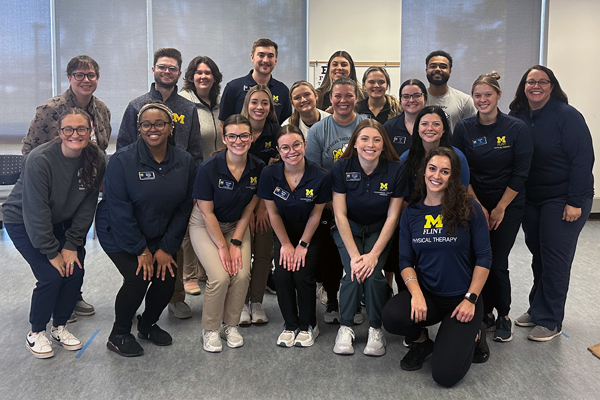
According to the ALS Association, approximately 5,000 people in the U.S. are diagnosed with amyotrophic lateral sclerois – the aforementioned ALS – each year, which averages out to about 15 new cases each day. It is estimated that up to 20,000 Americans have the disease at any given time.
The disease, also widely known as Lou Gehrig's disease, received that moniker after the famous New York Yankees baseball player was forced to retire from the game after developing the disease in 1939.
There is no cure for the disease, which is a progressive nervous system disease that causes loss of muscle control. And while the disease can be very difficult to manage for patients and caregivers alike, occupational therapy and physical therapy students from the University of Michigan-Flint recently teamed up to give families some hope.
Students from both disciplines created and hosted a lab to teach ALS caregivers skills for looking after their loved ones, leading both in-person and virtual sessions for 24 caregivers referred to the students by the Michigan Chapter of the ALS Foundation.
Occupational therapy students taught techniques for assisting with bathing and toileting, and how to use adaptive equipment. Physical therapy students demonstrated how to move a patient safely, including how to use a Hoyer lift, transfer someone with a slide board, and other techniques.
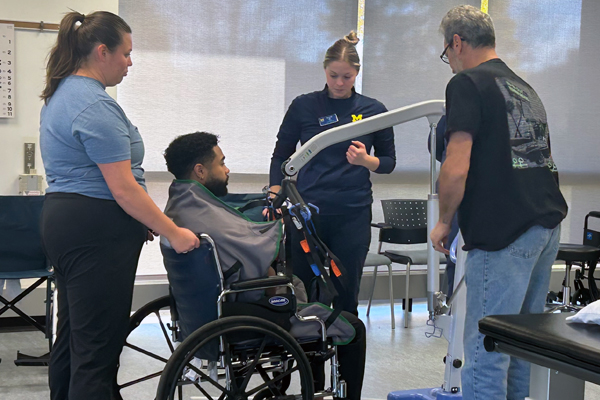
Attendees said that they left feeling better equipped to care for their loved ones as the disease progresses.
"As physical therapists, we are usually focused on the patient," said Carly Schluckbier, a PT student from Reese. "It was wonderful to also focus on caregivers. ALS is degenerative and out of a family's control. By teaching them techniques to care for their loved ones, we can give them some of that (control) back during a very hard situation."
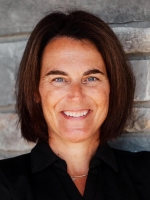
Amy Yorke, physical therapy professor, learned that the ALS Foundation was looking for learning opportunities for caregivers and decided it was a great project for her Professional Service Learning course. She recruited Elizabeth Yost, occupational therapy clinical assistant professor, who then brought it to her Research Methods and Research Design courses. They received a grant for the pilot project from UM-Flint's Center on Aging.
The 18 students were tasked with developing the lab from the ground up, with guidance from ALS clinicians from Henry Ford Hospital in Detroit. They also created videos and instruction manuals for the participants to take home. The group launched the project last May and met frequently before hosting the attendees last fall.
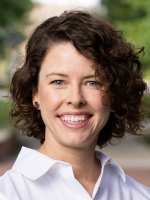
"One of the best ways to learn is to teach others," said Yost. "Students learned how to partner with a community organization to meet their needs and how to deliver content to a group of people who would benefit from additional services. The skills and knowledge they were able to practice are so important for them to become collaborative patient-centered practitioners."
Desireé Frantum, a physical therapy student from Detroit, said that she met a former ALS caregiver through this process who shared this important lesson with other caregivers – "Don't count their days, make their days count." Frantum used that as her guiding principle while developing the lab.
"I feel honored to be a part of the group that started this," said Frantum. "Caregivers are such special people. They do so much to make sure that their loved ones are comfortable, safe and happy and live out their life as best as possible. It was wonderful to encourage them."
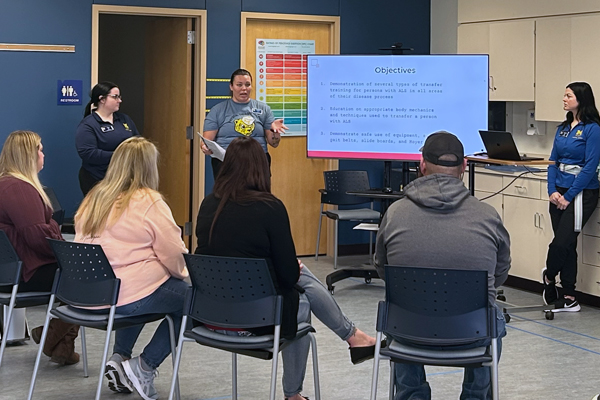
Hadley Moak, an occupational therapy student from Beverly Hills, Michigan, said the experience was truly eye-opening.
"Developing the lab was impactful and empowering," she said. "Caregivers have a lot on their plates and expressed concern about feeling fully prepared. It is so important to care for the people who are caring for patients."
Faculty hope to continue the lab each year. They say it fits right in with the College of Health Sciences' mission to both provide service-learning opportunities for students and give back to the community.
The project joins others that fall under the college's pro-bono clinic, HEART. Through HEART, PT and OT students provide rehabilitation services to community members each week. As part of the clinic, students also participate in other service learning projects, including providing balance screenings at senior centers and volunteering to assist with high school physicals.
"We get great opportunities at UM-Flint to put everything we have been taught into practice," Schluckbier said. "It was really rewarding to work with the caregivers and think about how the whole family is impacted."
Related Posts
No related photos.
Martha Pennington
Martha Pennington is the communications specialist for the College of Health Sciences. She can be reached at [email protected].